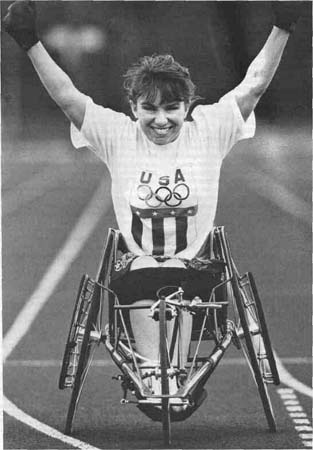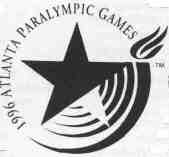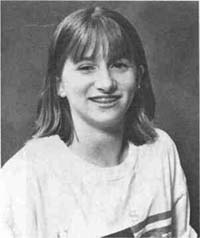Track athlete Linda Mastandrea, Elmhurst, will represent Team USA at the 1996 Paralympic Games
in Atlanta this August. (Photograph by Oscar Izquierdo.)
22 • Illinois Parks & Recreation • July/August 1996 The World's Greatest Athletes Meet in Atlanta this Summer— TWICE!
by Marybeth Jones, CTRS, CLP
The Olympic Games will officially begin with the lighting of the Olympic torch this July in the host city of Atlanta, Georgia, with elite level athletes representing nearly all parts of the world. One month later, on August 15, the Olympic flame will once again be ignited when more than 3,500 elite athletes with physical disabilities—representing more than 110 nations— enter the Olympic stadium to take part in the pageantry of the opening ceremonies of the 1996 Paralympic Games. A star-packed lineup will celebrate the opening ceremonies, including film star Christopher Reeve, who will serve as master of ceremonies. Legendary recording artist Aretha Franklin will sing an original composition entitled "What's Your Excuse?" created for the 1996 Paralympic Games. The Paralympic Games are the world's second largest sporting event, trailing only to the 1996 Centennial Olympics. The games are bigger—in scope, number of participants and events— than the World Series, Super Bowl and World Cup. Elite level athletes will compete in seventeen sports, fourteen of which are Olympic sports and two demonstration sports, making this the largest Paralympic Games to date. In ten days of competition, athletes will utilize essentially the same venues as the Olympic Games and the sites will be supported by a staff of 1,500 officials and more than 12,000 volunteers. The athletes who arrive in Atlanta for the 1996 Paralympic Games represent four international federations: the blind, paraplegics and quadriplegics, individuals with cerebral palsy, amputees and others (including dwarfs). Regardless of their disability, all competitors selected to represent their country's team must undergo intense training and meet strict qualifying standards to compete. Minor modifications are sometimes made to the rules of individual sports in order to accommodate the disabilities of the athletes. Athletes are classified according to functional level and compete against athletes with similar disabilities. Because athletes compete according to degree of disability, approximately 700 events will be offered (compared with 330 events at the Olympic Games). Chicago Area Sends Its Best! Fourteen athletes from the Virginia Wadsworth Wirtz Sports Program at the Rehabilitation Institute of Chicago (RIC)—the largest free-standing rehabilitation facility in the country—have qualified to compete on Team USA in the Paralympic Games in a variety of individual sports, including track and field, swimming, boccia, powerlifting, fencing and tennis. Team sport athletes will compete in quad rugby and sitting volleyball. RIC's Wirtz Sports Program was established in 1981 and offers 18 different sports and recreational activities for individuals with disabilities at varying levels of intensity and competition. Participants in the program come from Chicago and more than 100 communities outside of Chicago, including several from Wisconsin and Indiana. Veteran competitor Linda Mastandrea (photo above), an Elmhurst resident who was born with cerebral palsy, will represent the RIC Wirtz Sports Program and the United States as she takes part in the wheelchair track events held in the Olym- Illinois Parks & Recreation • July/August 1996 • 23
Fourteen-year-old Stephanie Brooks, Algonquin, is the youngest Paralympic
hopeful to compete on Team USA for the RIC Virginia Wadsworth Wirtz Sports
Program. (Photograph by Joseph Ficner.)
pic Stadium. Mastandrea has competed in World Track and Field Championships for the Disabled in Barcelona, Berlin, England and Argentina. She currently holds both national and world records in the 100, 200, 400, 800 and 1,500 meter events for her ability class. She will compete in the 100, 200 and 400 meter wheelchair track events at the 1996 Paralympics. When she's not on the track, Mastandrea practices law, focusing on the Americans with Disabilities Act (ADA) and disability laws. She also speaks to corporations, schools and community groups about sports for individuals with disabilities, disability laws and general disability issues. The RIC Wirtz Sports Program's youngest competitor is fourteen-year-old Stephanie Brooks (photo above) from Algonquin, Illinois, an honor student at Jacobs High School. Brooks, who was born with spina bifida, has been a member of the RIC sports program for a little over a year. She trains twice a day, five days a week and travels with the RIC Wave swim team. A fierce competitor, Brooks participated in only two meets before taking part in her first Junior National Championship in 1995. As a result of her performance at this year's U.S. Paralympic Trials in Indianapolis, Brooks earned a position on the U.S. Paralympic swim team. At the trials, she finished second to the current American record holder in both the 50 meter and 100 meter freestyle events. She also swam the 50 meter butterfly and set Wheelchair Sports USA records in all three events. Brooks will compete in the 50 meter fly, 50 meter free, 100 meter free and 4x50 free relay in Atlanta. Agencies or individuals who would like to learn more about competitive sports programs for individuals with disabilities should contact their local special recreation association or one of the following organizations. U.S. Olympic Committee
Coordinator of Disabled Sports Services U.S. Association of Blind Athletes
33 N. Institute Street Wheelchair Sports USA
3595 E. Fountain Blvd., Suite L-l Disabled Sports USA
451 Hungerford Drive, Suite 100 Dwarf Athletic Association
418 Willow Way
Marybeth Jones, Manager of Recreation Rehabilitation Institute of Chicago (RIC) Virginia Wadsworth Wirtz Sports Program
345 E. Superior Street Marybeth Jones, CTRS, CLP, is the manager of recreation for the Northwest Special Recreation Association. 24 • Illinois Parks & Recreation • July/August 1996 A Brief History of the Paralympic Games The Paralympic Games were born of the vision of Sir Ludwig Guttman, an English neurosurgeon at Stoke-Mandeville Hospital in Aylesbury, England. In 1948, Guttman organized the International Wheelchair Games to coincide with the 1948 London Olympics. The first effort was symbolic. A deliberate attempt to connect the Olympics and the Paralympics was not made again until 1960 when the first Paralympic Games were held in Rome, just a few weeks after the 1960 Rome Olympics. Four hundred athletes from 23 counties joined together on that glorious day in Rome. The Paralympic Movement was created and Guttman was saluted by Pope Paul XXIII, who declared, "You are the de Coubertin [the founder of the modern Olympics] of the paralyzed." Since then, the two events—the Olympic Games and Paralympic Games—have shared cities four times (Tokyo 1964, Seoul 1988, Barcelona 1992, Atlanta 1996) and countries three times (Germany 1972, Canada 1976 and the United States 1984). The Xth Paralympiad will be celebrated in Atlanta in 1996. In the first years, only wheelchair athletes competed. As the Paralympic Movement grew, other classes of athletes began to participate, including amputees, the blind, and those with cerebral palsy. In 1982, the International Coordinating Committee of World Sports Organizations for the Disabled (ICC) was established as a counterpart to the International Olympic Committee, with four international federations under its umbrella: Cerebral Palsy International Sports and Recreation Association (CP-ISRA), International Blind Sports Association (IBSA), International Stoke-Mandeville Wheelchair Sports Federation (ISMWSF), and the International Sports Organization for the Disabled (ISOD)—which governs amputees as well as les autres [others], athletes with a variety of other disabilities including dwarf athletes. In 1992, the ICC was restructured and has become the International Paralympic Committee (IPC).
Host Cities and Countries of the Paralympic Games 1960 Rome, Italy 1964 Tokyo, Japan 1968 Tel Aviv, Israel 1972 Heidelberg, Germany 1976 Toronto, Canada 1980 Arnhem, Holland 1984 Stoke-Mandeville, England and Nassau County, New York, United States 1988 Seoul, South Korea 1992 Barcelona, Spain 1996 Atlanta, Georgia, United States
Illinois Parks & Recreation • July/August 1996 • 25 |
|||||||||||||||||||||||||||||||||||||||||||||||||||||||



